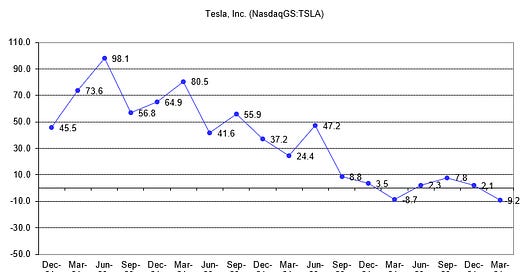A company either generates cash or it doesn't, regardless of how compelling the story. Financial statements reveal truths that even the most charismatic management teams cannot talk their way around.
Earnings: tariffs impacting & AI continued strength
Recent quarterly reports continue to offer some insights into the potential impacts of Trump's chaotic policy measures.
Tesla reported its eighth quarterly sales decline in company history, with revenue falling 9.2%. Interestingly, management has removed their sales guidance for 2025, citing ‘tariff uncertainty’ and that tariffs are likely to have a "meaningful impact" on demand. Tesla’s total revenue growth:
In the Aerospace and Defense sector, GE Aerospace, RTX, and Lockheed Martin all reported overnight. GE and RTX projected sales declines of 5% and 4% respectively due to tariffs, while Lockheed Martin believe they can largely offset the impact. GE stock rose 6% on the result, up 260% (21% CAGR) since former Danaher CEO Larry Culp took over in October 2018.
In the healthcare sector, both Intuitive Surgical and Danaher called out ‘material impacts’ (implying > 10%) as a result of tariffs.
AI related revenues continue to show robust demand, last week, chip manufacture TSMC reported stronger than expected numbers with revenue growing 60%. Further, management seems unperturbed by geopolitical issues, maintaining their guidance for the year-end and calling out AI-related revenue to double. Supporting TSMCs strong numbers, German software company SAP saw revenue up 12%, with cloud up 27%. Management stated that half of their ‘cloud order entries include AI use cases’.
Frugality
One of the most persistent traits of a high performing cultures is frugality. Warren Buffett famously lives in a tier two suburb in the very inexpensive city of Omaha and pays himself $100,000 pa. Wall Mart founder, Sam Walton only ever drove a pick up truck despite being the richest man in the US from 1982 to 1988. IKEA founder, Ingvar Kamprad was often quoted "I don't think I'm wearing anything that wasn't bought at a flea market. It means that I want to set a good example." And I once heard that ‘copper wire was invented from pennies being stretched’ by Constellation Software founder, Mark Leonard.
Recently I listened to a great interview with former Amazon software engineer Dave Anderson (link), who looks no older than 40 and is retired following just over a decade at Amazon.
Jeff Bezos more than understood the compounded effects of a frugal culture. Bezos would make a point of having his loyalty coffee card stamped daily to ensure he collected his free coffee when due. Whenever he flew with colleagues on his private plane, he would invariably declare ‘the company is not paying for this, I am’. From Amazon/Bezos leadership principles established in 2002:
Frugality. Accomplish more with less. Constraints breed resourcefulness, self-sufficiency, and invention. There are no extra points for growing headcount, budget size, or fixed expense.
Anderson highlights the many aspects of being a software engineer at Amazon and working within their high performing, frugal culture. Further, Anderson’s path to retirement (saving 85% of his earnings) also highlights the ‘type’ of people a culture of limiting waste will likely attract.
Something for your day …
Many people don't reach their greatest potential because they fear failure. In avoiding failure, they deprive themselves of a great teacher.
Michael Dell




